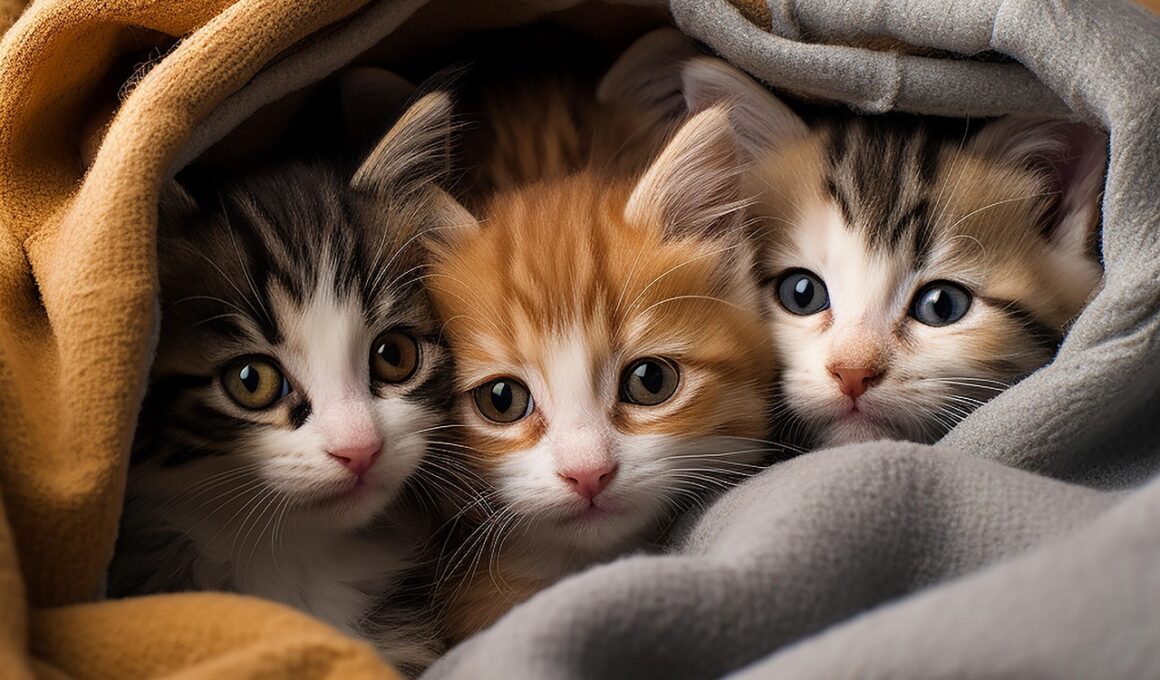The Importance of Socialization in Reducing Overdependence
When a cat becomes overly dependent on its owner, it can create substantial challenges both for the pet and the person. Overdependence can lead to behavioral issues such as anxiety and excessive vocalization. In understanding these problems, we can identify effective approaches to solving them. One of the most effective methods involves enhancing socialization. By immersing a cat in various social settings, they learn independence and other essential life skills. It’s crucial for owners to create an environment that encourages exploration and social engagement. Consider inviting friends over or engaging other pets within a safe space. Socialization exposes cats to new stimuli, reducing anxiety and helping them become acquainted with various situations. The exposure diminishes the feeling of isolation, which frequently amplifies dependence. By witnessing various interactions and responses, cats can adapt to their surroundings, fostering confidence. A well-socialized cat is typically more relaxed during periods of separation. This increased independence not only benefits the cat but also enriches the owner’s experience, leading to improved relationships and a happier household. Socialization thus becomes a fundamental element in improving the behavioral dynamics between cats and their owners.
Having multiple cats can sometimes underscore the importance of diversity during socialization. Each cat has a unique personality, and exposure to various species can facilitate better adaptation. Interacting with other animals offers cats the chance to learn from them and become more well-rounded. These interactions can lessen their reliance on their owners while also nurturing their natural instincts. Cats are naturally inquisitive, and socializing them with different pets allows them to engage in playful competition and development of essential skills. Setting up safe playdates with other friendly animals can stimulate social bonds and lessen anxiety levels. Furthermore, attending training classes designed for pets can encourage social experiences. Here, owners play an important role, guiding their cats through group interactions while ensuring overall safety. Owners also should be patient throughout this process, allowing their cats to dictate the pace of their social interactions. This method can be incredibly enlightening for both pet and owner. By gradually introducing new experiences, owners build a stronger balance of independence, reducing clinginess. Investing time in diverse social activities not only benefits the cat’s behavior but also fosters a positive relationship between the pet and its environment.
Creating Opportunities for Safe Exploration
Encouraging safe exploration is essential for reducing overdependence on an owner. Cats are inherently curious creatures; thus, enhancing their environment can greatly benefit their independence. Consider incorporating various enriching elements into the home such as climbing trees, scratching posts, and hiding spaces. These features invite exploration and promote mental stimulation. Cats often feel more secure when they have a variety of places to investigate, thus reducing anxiety associated with separation. Moreover, placing interactive toys around the house sparks curiosity and engagement. Puzzle feeders or toys that dispense treats keep them entertained when alone. This allows cats to engage their minds actively without relying solely on human interaction. Additionally, you can employ background noise like gentle music or even videos designed for cats featuring birds or moving objects. These can provide comfort in your absence and create an engaging atmosphere. Furthermore, giving your cat a window view of the outside world allows them to observe life beyond home. This stimulates interest in their environment and helps them feel confident exploring it. All these methods cultivate greater independence and can significantly help in mitigating overreliance on owners.
The role of play in socialization cannot be overstated when it comes to addressing dependency issues. Playtime is a profound way to build a bond and foster courage in a cat. Engaging in interactive games allows cats to assert their independence through successful hunts. Utilize various toys to vary the interaction experience, preventing boredom from setting in. Toys like feather wands, laser pointers, and even simple boxes create opportunities for physical activity and mental engagement. Scheduled play sessions help establish routines, further promoting social dynamics between the cat and its environment. Also, consider using treats as rewards during these play sessions, reinforcing positive behaviors and learning. Cats develop stronger instincts and confidence through regular playtime, envisioning themselves as capable hunters rather than reliant pets. When cats learn to entertain themselves through interaction, it breaks the cycle of overdependence. This transition not only reduces behavior problems but also encourages mutual enjoyment during shared experiences. A daily commitment to active play offers immense advantages that transcend just addressing dependency issues. It cultivates an enriching bond that fosters continued trust and security, allowing cats to develop a sense of self-reliance while strengthening the human-animal relationship.
Understanding Behavioral Signals
Recognizing cues related to your cat’s dependence can be crucial in implementing effective socialization strategies. Cats have unique ways of expressing their emotions and needs, and observing these signs can guide owners toward better engagement practices. Signals such as increased meowing, clawing at doors, or excessive following may indicate anxiety stemming from overdependence. When you notice these behaviors, it is imperative to respond appropriately without reinforcing dependence. Instead of rushing to comfort your cat every time they vocalize, consider redirecting them toward independent behaviors. Positive reinforcement can encourage your cat to settle down and explore environments without feeling clingy. For instance, when your cat initiates play alone, reward them with praise or a treat. Additionally, creating time for self-play by supplying engaging toys or interactive challenges can provide a sense of autonomy for the cat. Ultimately, understanding these behavioral signals fosters a deeper human-animal connection and helps your cat become more self-reliant. Acknowledging your cat’s need for independence should not be viewed as neglect but as an essential component of creating a harmonious household dynamic.
One of the essential aspects of reducing overdependence on owners is the gradual process of letting go. Transitioning from a dependent pet to a more independent one doesn’t happen overnight. Owners must practice patience and consistency throughout this adjustment. Start with short periods of separation, ensuring that the cat has activities to engage with during that time. This can initially be challenging as owners may feel guilty. However, it’s important to acknowledge that providing independence ultimately benefits the cat’s emotional well-being. If your cat exhibits signs of distress during separation, introduce comforting items such as blankets or toys infused with your scent. This can help alleviate anxiety while they adjust to spending time alone. Over time, increase these periods of separation, reinforcing their capacity to cope. Along with this approach, providing consistent routines and familiar environments creates a sense of security for the pet. Overdependence often stems from insecurity; thus, establishing these patterns allows cats to feel safe and more inclined to explore. By gradually fostering independence, owners facilitate emotional growth in their pets while cultivating enjoyable experiences, celebrating shared moments of connection when reunited.
Conclusion: Investing in Your Cat’s Future
Ultimately, investing time and effort in the socialization process is essential for reducing overdependence. By nurturing a cat’s independence, owners promote overall well-being, resulting in a healthier pet and relationship. The strategies discussed can create a balanced dynamic that benefits both parties. Additionally, don’t hesitate to seek advice from veterinarians or animal behaviorists for personalized guidance. Every cat is different, and some may require more tailored approaches to overcome dependence. Continued education and awareness about feline behavior challenges are key. By implementing enriching activities, ensuring safe exploration, and encouraging social interaction, owners do more than improve their cat’s skills—they also enhance companionship. A well-socialized cat adapts easily to changes in the environment, be it a new location or the absence of its owner. This flexibility is instrumental in their emotional and behavioral development. As cats develop a more robust sense of independence, owners experience less stress knowing their feline companions are secure and confident. In conclusion, socialization is not merely an aspect of pet ownership; it is an investment in a thriving future for both the cat and its owner, ensuring happiness and stability.
By implementing the strategies outlined, pet owners and their beloved cats can both experience significant rewards. The socialization process unfolds as an enriching journey, creating pathways to joy, confidence, and independence. As responsible caretakers, it is essential to prioritize the well-being of our pets. This enhances their lives and adds significant value to our daily relationships. The bond formed through social interaction is invaluable; being with other pets or engaging with their environment fosters learning and emotional growth. Socialization strengthens trust and nurtures independence, ultimately leading pets to thrive in a vibrant household. Taking small steps toward fostering independence can yield long-term benefits, resulting in balanced cat behavior and happy owners. The journey emphasizes that cats, like humans, need the freedom to explore their world. Allowing them this freedom nurtures their unique personalities and strengthens the bond between pet and owner. Each moment spent in play and social engagement enriches the lives of both cats and their human counterparts. Committing to socialization can transform your cat’s dependency into self-assuredness, creating a joyful atmosphere rooted in love and mutual understanding. Purchasing toys, setting routines, and engaging with other animals can comply effortlessly with these strategies.


